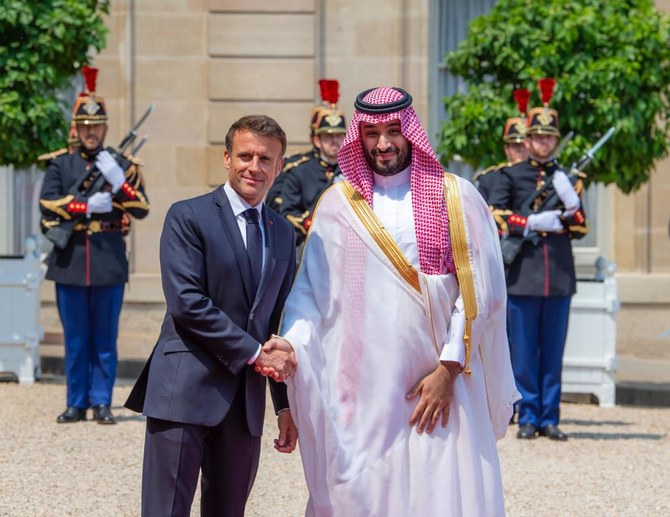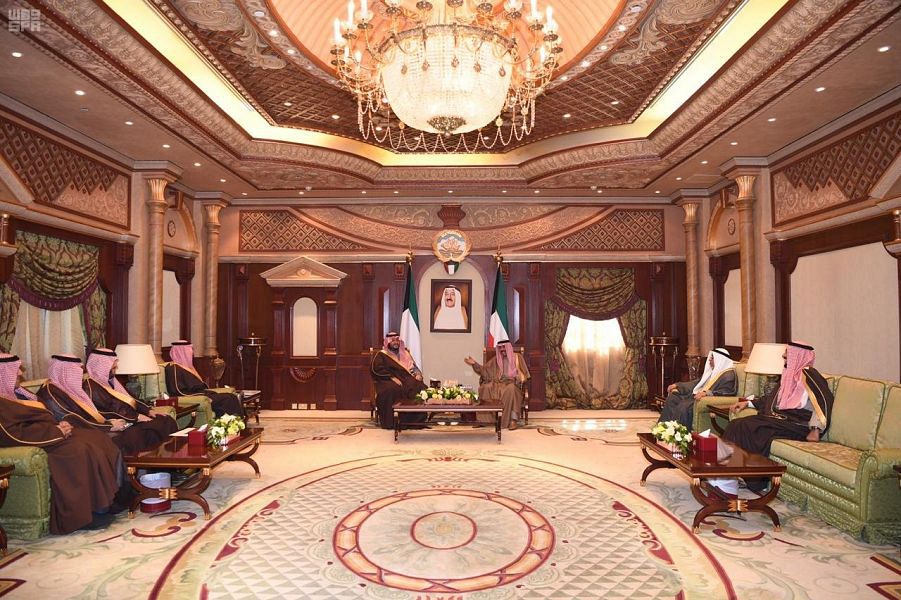
RIYADH: Saudi Arabia’s Crown Prince Mohammed bin Salman’s visit to Kuwait on Friday marked the final leg of his tour of the Gulf Cooperation Council countries in the lead-up to the annual GCC Summit, to be held in Riyadh on Dec. 14.
He previously visited Kuwait in his official capacity as deputy crown prince in May 2015, and again in Sept. 2018 after becoming the crown prince in June 2017.
The visit came six months after a meeting between him and Kuwaits Crown Prince Sheikh Mishal Al-Jaber Al-Sabah when the latter traveled to Riyadh for talks.
Crown Prince Mohammed bin Salman received by his Kuwaiti counterpart Sheikh Mishal Al-Ahmad Al-Jaber Al-Sabah. (Supplied)
On arrival in Kuwait City on Friday, Crown Prince Mohammed was received by Sheikh Mishal. He was later received by the Emir of Kuwait Sheikh Nawaf Al-Ahmad Al-Jaber Al-Sabah.
The emir bestowed the Order of Wisam Mubarak Al-Kabir on Crown Prince Mohammed bin Salman for his efforts “to strengthen the bonds of brotherhood and understanding between the countries of the Gulf Cooperation Council,” SPA reported.
Saudi Arabia and Kuwait have enjoyed close and cordial relations reaching back decades, assisting one another in times of crisis, engaging in reciprocal trade and tourism, and collaborating on defense and diplomatic matters.
They routinely coordinate their actions under the umbrella of the GCC in accordance with the bloc’s common visions and strategic goals, with a view to achieving integration between member states in different fields.
Kuwait Emir Nawaf Al-Ahmad Al-Jaber Al-Sabah bestows upon Crown Prince Mohammed bin Salman the Order of Wisam Mubarak Al-Kabir for his efforts in strengthening the bonds between GCC countries. (Supplied)
A similar cooperative spirit informs their roles at the Arab League, the Organization of Islamic Cooperation, the UN and various international bodies.
“Today, His Royal Highness Crown Prince Mohammed bin Salman bin Abdulaziz Al-Saud, deputy prime minister and minister of defense — may God protect him — arrives in his second homeland, the sisterly State of Kuwait,” Prince Sultan bin Saad bin Khalid Al-Saud, the Saudi ambassador to Kuwait, said in a statement ahead of Prince Mohammed’s arrival.
“It is the second official visit of his royal highness since assuming the position of crown prince. (The visit) is an extension of the successive visits of the leaders of Saudi Arabia to their brothers the rulers of the State of Kuwait, which confirms the strength and distinction of relations between the two countries, and that it has a solid and historical depth since the era of the founder King Abdulaziz bin Abdul Rahman Al-Saud — may his soul rest in peace.
“The importance of this visit comes as a continuation of his highness’s current tour of the GCC states and ahead of the 42nd Gulf Summit to be held in Riyadh on Dec. 14. This confirms the keenness of his highness — may God protect him — on the unity of Gulf cohesion, unifying stances towards regional, Arab and international issues, and raising the level of joint cooperation between the GCC states in various fields.
Crown Prince Mohammed bin Salman received by Emir of Kuwait Sheikh Nawaf Al-Ahmad Al-Jaber Al-Sabah. (Supplied)
“It is expected that many regional and international issues and developments that are in the interest of the region and its peoples will be discussed.”
The Saudi royal family has a fondness for Kuwait that can be traced to an act of generosity reaching back over a century.
In 1891, when Riyadh was seized by King Abdulaziz bin Abdul Rahman Al-Saud’s rival, Ibn Rasheed, the family and their supporters were given refuge in Kuwait.
In 1902, when King Abdulaziz recaptured Riyadh, the Al-Saud ruling family returned to Najd from Kuwait and reinstalled the Saudi State, later to unify the country.
The Uqair Protocol of December 1922 delineated neutral zones between Mandatory Iraq, the Sheikhdom of Kuwait, and the Sultanate of Najd — the fledgling Kingdom that would later become Saudi Arabia.
Crown Prince Mohammed bin Salman received by his Kuwaiti counterpart Sheikh Mishal Al-Ahmad Al-Jaber Al-Sabah. (Supplied)
It was the discovery of oil in 1938 in the Burgan Field, just north of the neutral zone on the Saudi-Kuwait border, that would change relations between the two kingdoms forever, with their leaders both agreeing to share the find. In 1965, the neutral zone between the two states was again renegotiated, while the maritime border was redrawn in 2000.
These shared interests have made Saudi Arabia and Kuwait natural partners, and contributed to the creation of the six-member GCC in 1981, thereby transforming a historic friendship into an institution able to promote economic and security cooperation.
This solidarity proved critical on Aug. 2, 1990, when Iraq’s dictator Saddam Hussein sent his armed forces to invade Kuwait. Now it was Saudi Arabia’s turn to offer Kuwait’s royal family and its fleeing officials sanctuary, as Iraqi troops annexed the country, seizing control over some 20 percent of the world’s oil reserves.
US President George H. W. Bush condemned the Iraqi invasion and began assembling a coalition of 35 nations, including Saudi Arabia, to help liberate Kuwait. Soon US forces established bases in the Gulf in preparation for the planned counterattack. In Jan. 1991, the coalition launched Operation Desert Storm.
Saudi jets and ground forces took part in several battles to repel Iraqi cross-border incursions and Scud missile attacks. By the end of February, Kuwait had been liberated.
Since then, common defense and security have been a high priority among GCC members. As recently as 2017, Kuwait hosted military drills involving US, Saudi and other Gulf armed forces.
In Dec. 2020, a month before the Gulf dispute was formally resolved with the help of Kuwaiti mediation and the signing of the AlUla Declaration, Kuwait’s Emir Sheikh Nawaf Al-Ahmad Al-Sabah thanked Saudi King Salman for the Kingdom’s role in promoting security and stability in the region.
However, the Saudi-Kuwaiti relationship goes far beyond oil, security and diplomacy. The two countries share many of the same core values, culture and even familial ties. These similarities in outlook have allowed them to entwine their development agendas.
One thing Kuwait is very well known for is its dynamic retail sector, making it a top shopping destination for everything from fashion to supercars. Kuwait’s largest shopping mall, The Avenues, is planning to expand into Saudi Arabia over the next four years with two new outlets in Riyadh and Alkhobar.
The move reflects the shared vision of both nations to diversify their economies away from dependence on fluctuating prices and finite days of oil and to instead embrace high-tech and creative industries, luxury tourism, small entrepreneurs, and the green energy transition.
A lot has changed in both countries over the past century, transformed from nomadic societies to steel and glass cityscapes. But throughout that transformation — and through thick and thin — they have remained good neighbors and firm allies.









